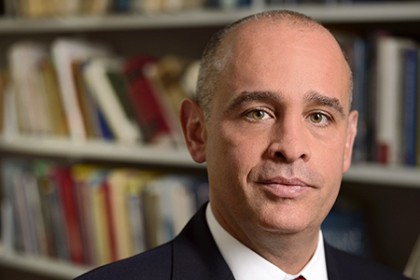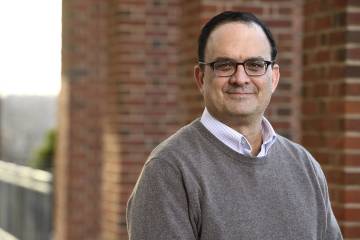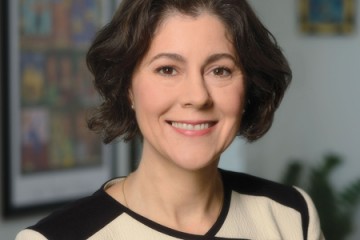Christopher S. Celenza, dean of Georgetown College at Georgetown University and professor of History and Classics, has been named James B. Knapp Dean of the Krieger School of Arts and Sciences at Johns Hopkins University.
Celenza's appointment, which begins Jan. 4, is a homecoming: He first joined the Krieger School faculty in 2005 as a professor in what was then the Department of German and Romance Languages and Literatures. Celenza went on to hold several leadership roles at Hopkins, ultimately serving as vice provost for faculty affairs until he departed for Georgetown in summer 2017.

Image caption: Chris Celenza
"The truth is I've been very happy at Georgetown, and I will greatly miss my colleagues and friends here," Celenza says. "But I couldn't be more excited about returning to Johns Hopkins, both because of Hopkins' deep-rooted respect for the arts and sciences and, more, for the work to be done, when it comes to fostering diversity and inclusion."
In a message to faculty, staff, and students today, President Ronald J. Daniels expressed his excitement over Celenza's return to lead the Krieger School at a critical moment in its history.
"I am thrilled to announce the appointment of Christopher Celenza as the Krieger School's next dean," Daniels wrote, adding that Celenza "earned a reputation as a strong and collaborative leader" at Georgetown. "I know Chris' experience, passion, and deep knowledge of the Krieger School and Baltimore community will serve the university well in the years ahead."
To identify a successor for Beverly Wendland, who departed in July to serve as provost of Washington University in St. Louis, the search committee was tasked with identifying a leader who could build on the strengths of the Krieger School while developing emerging opportunities into the next decade. The search led to Celenza, a multidisciplinary and international scholar who, after a long and successful tenure at Hopkins, went on to Georgetown to oversee 26 academic departments and 12 interdisciplinary programs that included 500 full-time faculty and more than 3,500 students.
While at Georgetown, Celenza advanced many strategic initiatives, including prioritizing efforts to foster diversity, inclusion, and equity while significantly refining faculty hiring practices. Celenza also developed a new undergraduate research program at Georgetown that provided students with more opportunities to explore career paths and took concerted steps to enfranchise faculty and build out mentoring programs for assistant and associate professors.
As a dean, meeting the needs of a community of scholars at various points in their careers is a challenge that can be met by fostering collaborative relationships where everyone has a role to play, Celenza says, citing the example of a lab led by a professor with contributions from post-docs, grad students, and undergraduates, all conducting hands-on research together.
"When we're working at our best, when those groups are in conversation with each other, that's when a university becomes a place of magic," Celenza says. "That's the model I love to see, when everybody realizes that knowledge-making is, like a lot of other things in society, a collaborative enterprise and that everybody has a part to play at every different level."
As vice provost for faculty affairs at Hopkins, Celenza worked closely with schools across the university to address issues related to recruiting and retaining faculty. His efforts included fostering collaboration, increasing faculty diversity and administering the university's ongoing Faculty Diversity Initiative, and working to assess and improve mentorship programs for junior faculty.
In addition to his role as a vice provost, Celenza held the Charles Homer Haskins Professorship. He also served as vice dean for humanities and social sciences. From 2010 to 2014, he was director of the American Academy in Rome, the United States' oldest center for independent art and humanities research based outside the country.
Celenza came to Johns Hopkins in 2005 after teaching for nine years in the Department of History at Michigan State University. He holds two doctoral degrees—one in history from Duke University and one in classics and neo-Latin literature from the University of Hamburg.
He has received numerous awards and grants, including fellowships from the Guggenheim Foundation, the Fulbright Foundation, and the American Council of Learned Societies.
He is the author or editor of 11 books and more than 40 scholarly articles in the fields of Italian Renaissance history, post-classical Latin literature and philosophy, and the history of classical scholarship. An Italian translation of his book The Lost Italian Renaissance was published in 2014.
While much of a dean's work is administrative, Celenza remains dedicated to his own research, in part to stay connected to the day-to-day life of the scholars he serves.
"I have just kept working," Celenza says. "I'm getting ready to submit the final type script to Cambridge University Press for my next book. I've always tried to make time for myself, sometimes early in the morning, just doing my own research. I've also kept teaching while I've done administrative work. At Georgetown, I taught seminars for first-year students because I feel like that's the way you keep in touch with everybody."
Posted in University News
Tagged university administration, krieger school, university news, christopher celenza









